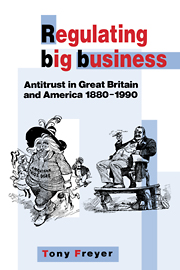Book contents
- Frontmatter
- Contents
- Preface
- Introduction
- 1 The response to big business: the formative era, 1880–1914
- 2 The divergence of economic thought
- 3 The political response
- 4 The courts respond to big business
- 5 The impact of World War I, 1914–1921
- 6 Tentative convergence, 1921–1948
- 7 A British antimonopoly policy emerges, 1940–1948
- 8 Uneven convergence since World War II
- Conclusion
- Notes
- Index
Conclusion
Published online by Cambridge University Press: 21 January 2010
- Frontmatter
- Contents
- Preface
- Introduction
- 1 The response to big business: the formative era, 1880–1914
- 2 The divergence of economic thought
- 3 The political response
- 4 The courts respond to big business
- 5 The impact of World War I, 1914–1921
- 6 Tentative convergence, 1921–1948
- 7 A British antimonopoly policy emerges, 1940–1948
- 8 Uneven convergence since World War II
- Conclusion
- Notes
- Index
Summary
During the formative era, American antitrust became a policy at war with itself. By establishing an amalgam of economic and moral imperatives as the basis for applying state law and the Sherman Act, state and federal authorities and the Supreme Court ironically nurtured giant corporate enterprise. The most successful big firms were able to shut out new competitors and thereby defeat one goal of antitrust policy. Yet the triumph of the rule of reason also reflected the recognition that bigness often made possible economies benefitting consumers, another purpose of antitrust law. Meanwhile, private suits and state and federal prosecution of cartel practices blocked price-fixing practices and promoted entry into the business order. Ultimately, the achievement of such divergent goals required the sort of flexible policy choices the American rule of reason facilitated.
The consensus favoring freedom of contract represented by the British courts' application of the rule of reason, however, gave lawmakers little direct influence over business structure in Britain. As a result, family enterprise preserved its influence and often impeded the attainment of organizational and production economies arising from centralized management. Without an antitrust policy, commentators believed, Britain lacked the means to influence the direction of its economy at a time when its competitors possessed such means, placing itself at a comparative disadvantage.
The rise of big business thus engendered a divergent response from British and American lawmakers. Prior to the 1880s, neither nations' courts generally enforced the restrictive practices businessmen established.
- Type
- Chapter
- Information
- Regulating Big BusinessAntitrust in Great Britain and America, 1880–1990, pp. 324 - 333Publisher: Cambridge University PressPrint publication year: 1992



